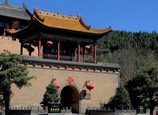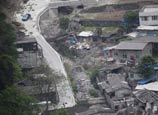
HANOI, April 24 (Xinhua) -- Vietnam's surface water is plagued by concerning problems including depletion and large-scale pollution, according to Radio the Voice of Vietnam (VOV) website on Wednesday.
With its network of criss-crossed rivers, including 13 major river systems covering an area of 10.000 square kilometers, Vietnam's surface water resources account for around 2 percent of the world's total river flow.
International water resource organizations recommend limiting their exploitation to a maximum of 30 percent of their flow. In reality, most of Vietnam's central and Central Highlands provinces are exploiting over 50 percent of their rivers' flow. Central Ninh Thuan province, about 1,100 km south of capital Hanoi, exploits up to 80 percent of local flow.
The excessive resource exploitation has seriously degraded the quantity and quality of water resources in the basins of major rivers like the Red River, the Thai Binh River and the Dong Nai River.
Climate change's compounding impacts have affected the volatility of Vietnam's rainy season, increasing the probability and severity of both drought and flooding.
In recent years, the rainy season has usually ended early, causing droughts in many regions across the country. Water resource depletion is particularly severe in the central, Central Highlands and southern regions.
Many industrial zones, factories and urban areas discharge waste water into lakes and rivers, leaving parts of the country with water rendered unusable through contamination.
Waste water from industrial zones is a serious threat to the health of Vietnam's surface water.
The agriculture sector is the country's largest water user and contributes a major proportion of national waste water.
Due to excessive use, an average of 2030 percent of agricultural plant protection chemicals and fertilizers will eventually end up in surface water and accumulate in the soil, contaminating the soil eventually.
Most towns currently have no waste water treatment systems. Residential areas, tourist sites, and even handicraft producers all discharge waste water into rivers and lakes, contributing to the pollution of aquatic systems in Vietnam's urban and suburban areas.
















 China’s weekly story
China’s weekly story
(2013.4.13-4.19)


![]()
